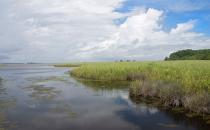NC denial of Mountain Valley Pipeline permit found consistent with Clean Water Act
The North Carolina Department of Environmental Quality complied with the Clean Water Act and state water quality laws in denying water quality certification to Mountain Valley Pipeline, LLC, for construction of its Southgate Project natural gas pipeline, as just decided by the U.S. Court of Appeals for the Fourth Circuit.
The court did, however, vacate the decision, sending it back to DEQ to provide more explanation for its denial. SELC joined the suit to defend DEQ’s decision on behalf of Haw River Assembly.
“We are pleased the court affirmed the department’s ability to protect North Carolina’s rivers and streams from needless harm,” says Jean Zhuang, an SELC attorney. “The only task remaining is for the state to explain its decision more fully and again deny certification for this unnecessary, destructive pipeline.”
If built, the Southgate pipeline would cut through 50 miles of rural North Carolina, trenching through hundreds of streams and wetlands and polluting the Haw River and its tributaries.
“In denying the certification, the department prioritized the health of our communities and our rivers and streams over an unnecessary fossil fuel project,” says Haw Riverkeeper Emily Sutton. “We are glad that the court found the agency has the authority to do so, and we look forward to the department continuing to protect our waters by again denying the pipeline’s certification.”
The 75-mile gas pipeline is proposed as an extension to transport gas from the incomplete “Mainline” Mountain Valley Pipeline from Virginia into central North Carolina. The Mainline is more than three years behind schedule and has nearly doubled its original budget.
The company’s attempts to rush the approval process led to vacated federal permits, and its rushed construction has led to more than 300 water quality violations and millions of dollars in penalties in West Virginia and Virginia. With legal uncertainties clouding the future of the mainline, DEQ refused to allow the Southgate pipeline to plow through North Carolina’s rivers, streams, and wetlands.
Regionally, renewable energy sources are becoming more affordable and abundant, while the health and environmental consequences of natural gas drilling and transport become ever more evident.
SELC supports a transition to cleaner fuels, and an end to new investments in fossil fuel infrastructure.

